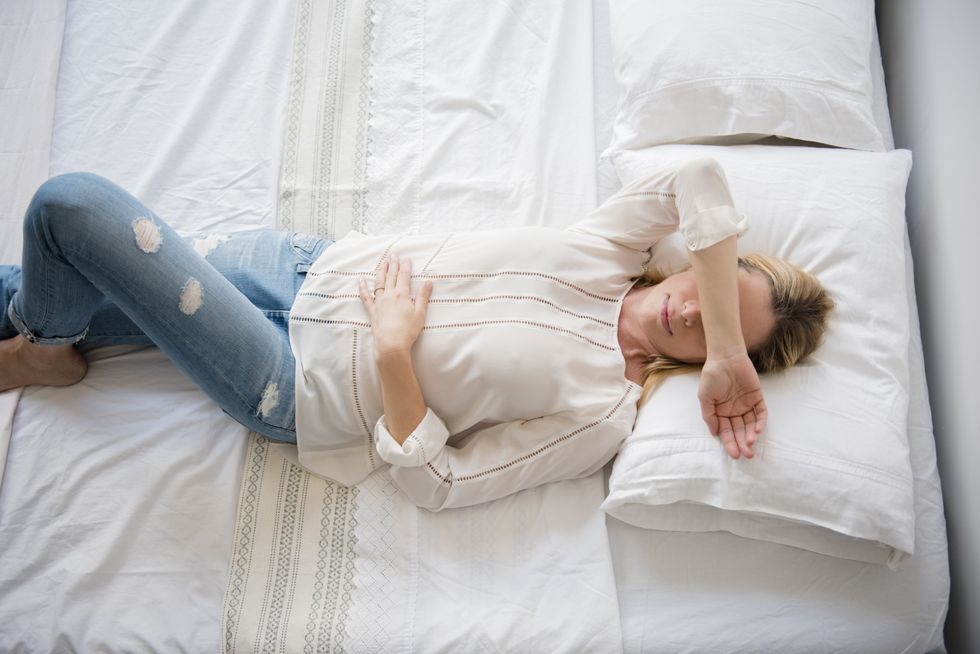Expert shares how to sleep better and why we need more rest in the wintertime
The expert shared top tips to sleep well
Don't Miss
Most Read
Winter does not only bring shorter and colder days but it also brings the innate need for more rest for many Britons.
As temperatures drop and daylight decreases, our sleep patterns are affected and we need more sleep to maintain our health.
Sleep expert and managing director of Woolroom, Chris Tattersall, explained why winter weather has such an impact on sleep quality, and shared advice on how to maximise that extra time in bed.
The expert said: "When the number of daylight hours decreases, our bodies produce more melatonin; the hormone responsible for making us feel sleepy. Many Britons therefore feel tired earlier and need more sleep to feel refreshed for the new day."

The expert shared why we need more sleep in the winter
| GETTYChris explained that the chillier times impact our routines as we feel more drained and lack the energy we need to prepare for bed.
He said: "Sleep routines are also often impacted by colder temperatures, as we need more energy to keep ourselves warm and maintain our immune systems at a time when sickness is common.
"This increased energy consumption can lead to people feeling drained, meaning more sleep is required to help us wake up feeling refreshed the next day.
"Another crucial reason that sleep matters more in winter is mood regulation. Having the right amount of deep, restorative sleep can help to combat seasonal affective disorder (SAD) and improve mental wellbeing."
To combat this, the expert advised four ways for people to sleep effectively in the winter months.
Maintain the right temperature
The expert said: "While it is tempting to turn up the central heating on chilly nights, the optimal sleep environment should remain cool, ideally between 15 and 20°C.
"This is because our bodies cool down naturally while we are resting, so overheating our bedrooms can disrupt this process, leading to lighter, less restorative sleep."
Create a relaxing bedtime routine (and stick to it)
Chris advised: "Your body’s transition to sleep starts hours before your head hits the pillow. Natural sunlight exposure during the day helps produce cortisol, keeping us awake and alert.
"As evening approaches, however, we need melatonin, the sleep-promoting hormone, to kick in and help us drift off.
"One effective way to encourage melatonin production is by minimising screen time.
"Blue light from devices like smartphones and computers interferes with winding down because it tricks our brains into thinking it is still daytime."
LATEST DEVELOPMENTS

The expert said a wake-up routine is just as important as a bedtime routine
| GETTYThe expert added: "To sleep better, try switching off your devices at least an hour before bed and pick up a book instead.
"Reading helps switch off mental 'chatter' and engages our imagination, helping us to enter a calm, restful state. There is a reason why bedtime stories are so effective!"
Wake up on the right side of the bed
Making sure we have a wake-up routine to go with our bedtime routine is a key component to kick-start the day.
The expert said: "A consistent wake-up time each morning is just as crucial for your sleep quality as a solid bedtime routine.
"Maintaining a regular schedule trains your body to regulate hormones more effectively, helping you fall asleep and wake up more easily. Aim to get up at the same time every day to support your internal body clock.
"In winter, the lack of morning sunlight can make waking up feel like a chore. Sunrise alarm clocks, which gradually fill the room with light, can simulate dawn and help boost morning hormones that trigger alertness.
"Better still, spend 20 minutes outside in the morning. Exposure to light and fresh air can help reset your systems, encourage nourishing sleep and improve your mood all day."
Design a sleep-friendly environment
Chris said: "Your bedroom should be a sanctuary for sleep. Keeping it dedicated to rest can help your brain associate bed with relaxation.
"Avoid lying in bed for too long while awake; if you are winding down with a cosy film or a book, set up a spot on the sofa with blankets and cushions for ultimate comfort.
"When you reserve the bed just for sleep, you strengthen your brain’s association between being in bed and falling asleep, making it easier to drift off when it is time."










